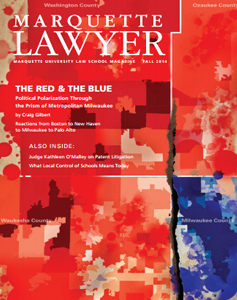New Marquette Lawyer Magazine Looks At Evolution of Important Issues
 How did we get where we are today? Consider that a central question underlying many of the stories in the Fall 2014 Marquette Lawyer magazine, being mailed this week and now available online.
How did we get where we are today? Consider that a central question underlying many of the stories in the Fall 2014 Marquette Lawyer magazine, being mailed this week and now available online.
As Wisconsin’s heated election for governor heads to a conclusion Nov. 4, the cover story of the new magazine provides both rich detail and thoughtful perspective on how Wisconsin, especially the Milwaukee area, became so politically polarized. Craig Gilbert, the Washington Bureau chief of the Milwaukee Journal Sentinel, spent much of the 2013-14 academic as Marquette Law School’s Sheldon B. Lubar Fellow for Public Policy Research. Gilbert worked closely with Charles Franklin, the Law School’s Professor of Law and Public Policy and director of the Marquette Law School Poll, in developing insightful data that show the changes. Gilbert calls southeastern Wisconsin “the most polarized part of a polarized state in a polarized nation.” Six experts provide perspective on what Gilbert’s findings mean in essays that accompany the piece. You may read it all by clicking here.
